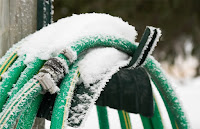Fall Checklist of Things You Should Do Before Winter Sets In

When the last of summer's heat is a faint memory, and you're pulling out your hoodies more than your shorts, it's time to tackle a few simple chores that'll make winter more pleasant and prevent some nasty surprises next spring. This fall checklist will help: #1 Clean and Stow Your Mower If you’re not familiar with fuel stabilizer, get to know it. If your mower sits for months with gas in its tank, the gas will slowly deteriorate, which can damage internal engine parts. Fuel stabilizer ($10 for a 10-ounce bottle) prevents gas from degrading.Add stabilizer to your gasoline can to keep spare gas in good condition over the winter, and top off your mower tank with stabilized gas before you put it away for the winter. Run the mower for five minutes to make sure the stabilizer reaches the carburetor. Another lawn mower care method is to run your mower dry before stowing it. 1. When the mower is cool, remove the spark plug and pour a capful of engine oil into the spark plug ho...



